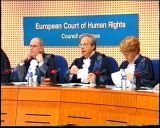Domestic investigation
Immediately after Fatima learned about her son’s detention, she started searching for him. In February and March 2000 she visited all the prisons in the area. She appealed to different departments of the Public Prosecutor’s Office, the Ministry of Justice as well as to the office of the Special Presidential Representative for the Protection of Human Rights and Freedoms in the Republic of Chechnya, Vladimir Kalamanov.
Despite numerous letters and pleas, however, the Russian authorities refused to open a criminal case. On 24 November 2000, the military prosecutor of military unit no. 20102 in Khankala, the headquarters of the Russian military forces in Chechnya, wrote that the “attached materials failed to substantiate the involvement of any military servicemen in the disappearance of the applicant’s son.”
The Russian authorities launched a criminal investigation into the disappearance of applicant's son, Murat Yandiyev, only on 14 July, 2001, almost a year and a half after the event. The criminal investigation was repeatedly suspended, however, and only re-opened after complaints from Fatima and her representatives.
No meaningful investigative steps were taken before the European Court notified the government on 17 November 2003 that an application had been lodged in the case. Even after this date, numerous important investigative steps were not taken for a long time, including interrogating eye-witnesses.
Procedure at the European Court of Human Rights
 Realizing that it would be impossible for her to achieve any redress through the Russian judicial system, Fatima, represented by the British barrister Gareth Peirce, lodged an application with the European Court of Human Rights on 11 April 2001. The organization Stichting Russian Justice Initiative has since assisted Peirce in the case.
Realizing that it would be impossible for her to achieve any redress through the Russian judicial system, Fatima, represented by the British barrister Gareth Peirce, lodged an application with the European Court of Human Rights on 11 April 2001. The organization Stichting Russian Justice Initiative has since assisted Peirce in the case.
In the application, Fatima argued that her son was ill-treated and killed by federal forces and that no effective investigation was carried out into the circumstances of his ill-treatment and “disappearance”, in violation of Articles 2 (right to life) and 3 (prohibition of ill-treatment or degrading treatment or punishment) of the European Convention on Human Rights. She also maintained, under Article 3, that she had suffered anguish and emotional distress in connection with the “disappearance” of her son. In addition, she relied on Article 5 (right to liberty and security), Article 6 (access to court), Article 8 (right to respect for family life) and Article 13 (right to an effective remedy).
The Court notified the government about the application on 17 November 2003. In this correspondence, the Court requested that the government provide a copy of investigation file to allow the Court to assess the quality of the investigation. Despite this and several subsequent requests, however, the Russian government refused to provide the Court with a copy, claiming that the investigation file contains state secrets.
The European Court of Human Rights declared the case admissible on 15 September 2005.
On 8 December 2005, the Court conducted an oral hearing in the case. Part of the reason for requesting an oral hearing was most likely the government’s refusal to provide a copy of the investigation file. Three weeks before the oral hearing, the government changed its mind and submitted a copy of the investigation file in spite of its previous arguments that the file contains state secrets.
